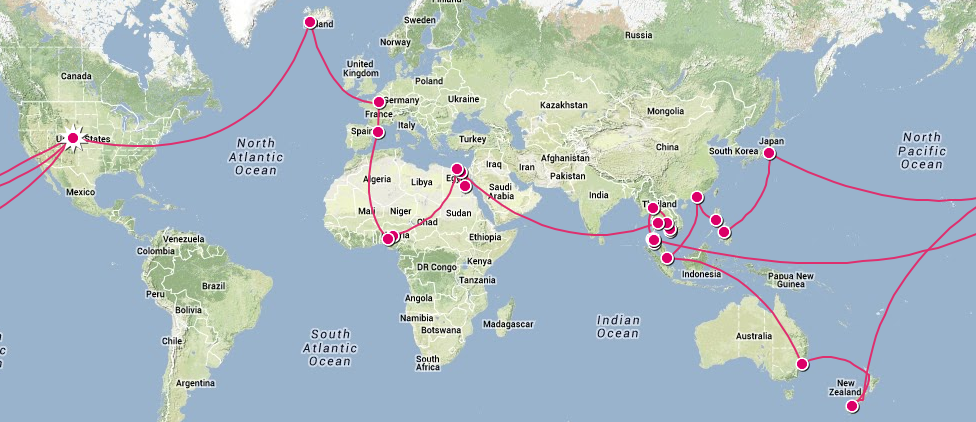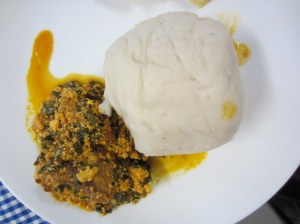Volunteering with our friends Mark and Abby in Nigeria was at the top of the list for our journey this winter. Once we had the dates set for our volunteer time with them, we planned the rest of our travels around that.
We flew into Abuja, Nigeria on Friday, January 17. That night, we stayed in a guesthouse in Abuja and had dinner with the rest of the volunteer team we would be working with during our stay. The volunteer team – pictured from left to right – Back Row: Jay, Chris from Toronto, Michael from Toronto, Ricky from Virginia, Tami and Megan from St Louis, Glenn from Calgary; Front Row: Me, Will from Atlanta, John from Philadelphia, Mark & Abby from Colorado.
The following morning, we all loaded into a van for the drive from Abuja to Egbe. The trip can take anywhere from 6 hours to 16 hours, depending on road closures and road conditions, traffic, etc. The road is not paved the entire way and in pretty bad shape in places. We were fortunate to make it safely to Egbe in just 6 hours. The drive provided the perfect team building experience (both because of what we saw and experienced on the road, as well as all the conversations we had along the way). It felt like we started the drive as individuals and ended the drive as a team, which was pretty cool.
Upon arriving at the hospital compound in Egbe, Abby gave us a tour. The compound was much larger than I had imaged. There are so many different buildings and housing units that it took me a number of days to remember what was what. It was a little overwhelming to see it all and get a first hand look at just how much work needs to be done as part of the revitalization project.
The ECWA Hospital Egbe was founded in 1952 and is the only multi-service health care facility within a 100 mile radius. On site is a residency program for doctors, a school of nursing, and a school of midwifery. Unfortunately, things have deteriorated over time and the hospital stands in need of restoration of infrastructure and hospital staff. Thankfully, many people across the globe have developed a heart for the hospital and have come together to address these needs through the revitalization project. Mark & Abby have been here for almost two years now, serving as project managers.
Although many locals are involved in the project (17 on payroll full time, 30 paid contractors, and many volunteers from the community), volunteer teams from the U.S. and Canada are brought in to fill in the gaps – bringing much needed supplies and skill sets to the project, particularly in skilled trades. In addition to the construction projects for the hospital itself (including a new outpatient building as well as lots of remodeling), homes on the compound are being built and remodeled in order to accommodate the growing hospital staff and missionaries (e.g. medical director, hospital administrator, surgeons, etc.). Many missionaries will live here full-time from this point forward to ensure the sustainability of the hospital from now on.
It is humbling to see the condition of the hospital. It’s a far cry from the facilities we have in the states. Simple hospital beds line the walls. There is no fancy medical equipment or beeping machines; just the basic necessities for providing care. Just the fact that the building is open-aired and not air-conditioned makes it feel like a major step back in time. Interestingly, there is no food service provided by the hospital; families are provided an area outside where they can cook food to bring to the patient (Nigerians typically cook outside over a fire).
There is no health care insurance here. Payment is required in cash before treatment is performed (except in cases of emergency). If a patient stays longer than a day, then payment must be made each day. A patient is not allowed to leave the hospital until their bill has been paid. As much of the population here has little or no savings, if a family member requires care, they will often go around the community and collect money from family and friends in order to obtain the cash necessary for treatment.
Our daily schedule here (except for Sunday) is breakfast at 7, followed by devotions, then work from 8-5 with a break for lunch. We eat all our meals together as a volunteer team, and there is a kitchen staff who prepares all the food. I was expecting that the food would not be good and I would survive by supplementing the food provided with the bag of snacks we brought with us. Thankfully, that was not the case.
A typical Nigerian meal is rice and beans with red sauce. Another typical meal is pounded yam. The yams here are big and white. They boil the yams, then pound them in a large pot. The yams themselves don’t have much flavor, but you eat them with egusi soup, which is quite flavorful (vegetables with sauce and spices).
On Sunday mornings the kitchen staff is off. One Sunday, Jay offered to cook breakfast for everyone. He made an egg scramble, using the ingredients he could find in kitchen. It was delicious!
As far as the work we are doing here, Jay’s focus has been on the construction of a duplex as well as helping with the dam project. At the duplex, he’s been busy tiling from wall to wall – even the baseboards are done with tile. He also did plumbing work for the house.
At the dam, work continues on cleaning out the cistern and working on the pump. Just today, they got the new pump up and running – and we are anxiously awaiting to see if water will flow the 2 km from the dam to the hospital compound. Who knows – maybe within the next couple days, water will be flowing! Praying! The condition of the pipe is unknown, so we hope digging up 2 km of old pipe and installing a whole new one will not be required.
The lack of running water is a serious issue here. On the hospital compound, there is enough water to have running water for a couple of hours in the morning and a couple of hours at night – but in town, folks do not have running water and must fill and use buckets for water. As you can imagine – this leads to sanitation issues, such as limited hand washing. With people eating with their hands instead of using silverware and the fact that they do not use toilet paper, but instead use their hands to wash themselves afterwards, this is a serious sanitation issue. Not having running water creates a number of problems. It’s something we just take for granted at home. Being here is a daily reminder of just how many people in the world don’t have this basic necessity.
As far as the what I’ve been working on, my main focus over the last week has been on the organizing and inventory of the “garage” and all the tools. It has been a much, much larger project than I anticipated. There is no “Home Depot” in town or anything like that where all the needed supplies and equipment can be purchased; instead, the project has had to create their own on-site “Home Depot” with all the necessary items for construction. There are a very limited number of supplies that can be obtained locally, so most everything is brought in from miles away (and many, many things all the way from the U.S.). With so many different workers on site, new volunteer teams coming in every two weeks, and shipping containers full of supplies being sent here for the project on top of the fact that there several different construction projects going on at the same time, you can imagine how difficult it is to keep everything in order. I’ve been thinking of my dad and sister quite a bit during this work – they are both so talented at organization and putting systems in place. I’m trying to channel those genes!
There has also been lots of odds and ends things we’ve been helping with during our stay. We’ve even had the opportunity to take part in an Egbe Community “Block Party”! And by block party, we’re not talking grilled burgers and bags of potato chips. It’s literally a whole bunch of folks moving blocks of cement bricks – the many, many bricks for the new outpatient department building that is being built. It’s a time when everyone working on the various projects around the compound comes together to work as one – which is what makes it a party and actually kind of fun.
Now, don’t get me wrong, it’s hard work here and the days are hot and sweaty. Each day here is a daily surrender to God. Each day I pray for the endurance and encouragement to give it my all during my time here. I know that in my weakness, HE is strong. And in Christ, ALL THINGS are possible. And one day, in the not to distance future, where this foundation and cross stands, a new hospital building will stand that will serve many people from all over Nigeria.
And already, missionaries are here and more are on their way, that will fill the homes being built and remodeled, and through the hospital they will serve the people of this community for years and years to come – both physically and spiritually. And that is what makes it all worthwhile.

















I think I read on the Anderson’s link they are making those blocks on site. Maybe you can post a photo of that operation. Is calcium silicate (cement powder) found there naturally? Do they have to manufacture them close to the water source and then move them a distance? I cannot imagine what a mammoth undertaking this is with limited supplies and tools in a remote location.
They have a cement mixer powered by a diesel generator. The cement powder comes from a plant about 3-4 hours from here. They have a big tank of water next to it – they can either buy the water or fill it with water from the hospital compound’s source. I’ll try to get a picture when they are running it. From where they are making the cement bricks to the OPD building site is only a short walk, so all the bricks are being transported by hand.
So good to read your words on the work at the hospital in Nigeria. It looks difficult. It definitely is needed. Good job/genes on organizing the home depot supply area. I am sure Jay really enjoyed fixing that breakfast. Nice to see photos. I might have enjoyed the block party. Take care.
Yes, lots of work to be done. You would have enjoyed the block party. It was a good workout! Funny part was that while we were moving the blocks, a rat came out of them and all the Nigerians started chasing it around, trying to stomp it with their foot. Less than a minute later, one guy had it under his foot. We learned later that whoever catches it gets to eat it for lunch; which is a special treat for them since they don’t get to eat meat much around here.
I can only imagine how exhausting yet rewarding each day is! Your organization skills look great by me…good job!! 🙂 The lack of water and proper sanitation would be a real challenge for me. We do take so MANY things for granted!!